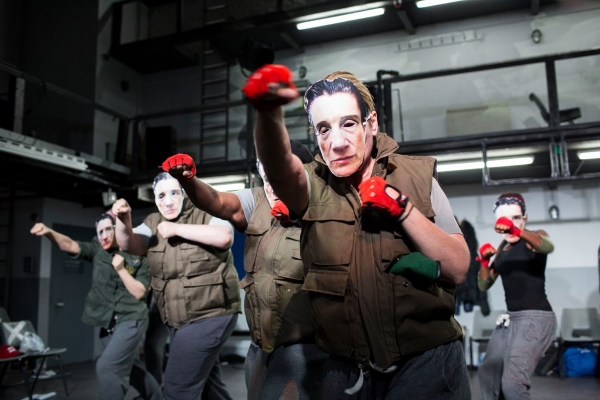Henry IV (Donmar Warehouse)
Phyllida Lloyd presents her second all-female Shakespeare production, reuniting with Harriet Walter

© Helen Maybanks
Phyllida Lloyd's latest all-female production is what you get when you cross the women's prison setting for Julius Caesar and the secure unit concept of Ian Rickson's Hamlet. Throw in the fact that the evening conflates both Henry IVs into one play (although that's slightly over-stating the reality – there are only three scenes from the second part) and is played without an interval, at a brisk two hours, and we have a pretty radical interpretation.
That's the theory anyway, and there are certainly some revolutionary insights. There are the unspoken hints that the relationship between Ashley McGuire's Falstaff and Clare Dunne's Hal is a lesbian one – the rejection of Falstaff at the end hitting hard – and the obsessive workouts by the rebels hint at a muscular attempt to re-assert the prison pecking order. One wonders how the shifting medieval alliances have echoes in the prisoner hierarchies.
But the biggest flaw is the omissions: great slabs of the comedy have disappeared – there's no Pistol, no Nym, no Doll Tearsheet, no Justice Shallow and hence no opportunity for he and Falstaff to reflect of the passing of time – perhaps too delicate a topic in prison. But by dispensing with so much of the comedy, Hal's dismissal of Falstaff does not have the usual emotional punch.
With the diminished role for Falstaff, Hal has to carry much of the play and Dunne's sparky prince is well up to the task. Her strutting, livewire Hal readily acquires kingly authority and it's her presence that dominates much of the action. She's well supported by Jade Anouka's combativeness Hotspur; a cocky, street-savvy counterpart, while Ellen Nabarro's harsh grey set provides a suitable backdrop to the action.
Harriet Walter's King Henry seems to be on a different level to everyone: older than the rest of the prisoners (one does wonder what she's inside for), her verse speaking is in a different league. There's a genuine world weariness when she chides Hal for his eagerness to pick up the crown, and when she sighs "Thou seek'st the greatness that will overwhelm thee," she speaks with the burden of one worn down by regal duty.
The Donmar is to be applauded for exploring new ground with its all-women trilogy – the dominance of Shakespeare does lead to a paucity of opportunities for actresses. And it should be doubly applauded for shying away from plays that would, at first sight, offer more possibilities to an all-female cast, for example As You Like It or Twelfth Night.
The Henrys, with their alpha males Hal and Hotspur almost dripping with testosterone, present a real challenge, and while it doesn't fully work, it's certainly another insightful take on two of Shakespeare's greatest plays.













